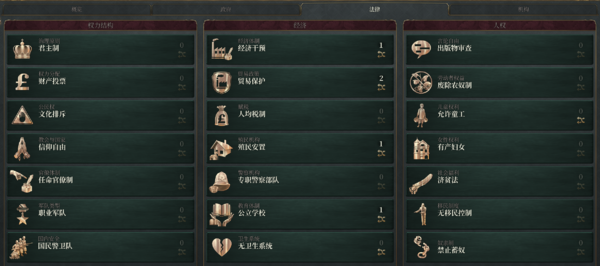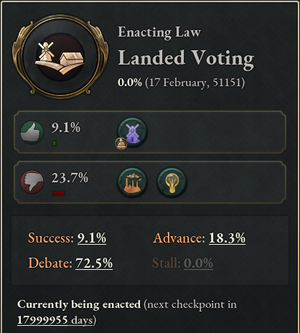法律,即国家的法律体制改革,其为人口群创造了不同的政治、经济和社会条件。随着时间的推移,法律对社会结构产生缓慢渐进、或快速而革命的改变。
在游戏开始时,所有国家都拥有与1836年时代条件相对最适的法律。法律在不同国家间差别很大,且极大地影响着玩家在游戏过程中的环境和策略。
其他方面的不同影响与开局法律发生的相关作用,亦是维多利亚时代历史特征与有形社会存在所发生的相关作用。这会促使历史向着更熟悉的方向发展。
也就是说,开局法律并非一成不变,玩家可根据社会发展方向进行具体调整。
制定法律
Enacting a new law is a process that takes several steps. First, a law needs support to be chosen. Either at least one interest group in the current government needs to be in favour of the law proposal or there has to be an active movement to support the law. Next, it progresses through enactment with a periodic chance to be enacted, advanced, debated, or stalled. Finally, the law is enacted or its enactment can be abandoned. Only one law can be in enactment at a time.
Law support
Support for a law can come from an interest group in the government, a movement, or directly from the ruler's ideology. Interest groups' ideologies and their leaders' ideologies affect which laws they support along a 5-point scale from ![]() strongly disapprove to
strongly disapprove to ![]() strongly approve. Interest groups support any law that is preferred over the current one; similarly they oppose any law that is less preferred over the current one. Interest groups in government (along with movements and ruler's ideology) provide the initial success and stall chances to a laws enactment, so having more interest groups in government gives more options for laws to enact, but also makes it potentially more difficult to enact those laws unless the interest groups are ideologically aligned.
strongly approve. Interest groups support any law that is preferred over the current one; similarly they oppose any law that is less preferred over the current one. Interest groups in government (along with movements and ruler's ideology) provide the initial success and stall chances to a laws enactment, so having more interest groups in government gives more options for laws to enact, but also makes it potentially more difficult to enact those laws unless the interest groups are ideologically aligned.
Aside from providing support, interest groups gain or lose approval based on current laws and proposed changes. Changes have five times the effect on approval, but that effect decay over five years. Thus, a quick way to appease an unhappy or angry interest group is to propose a change to a law they approve of. Even without the intention to actually enact it, it can provide time for other effects to wear off or take place.
Enactment process
Once a law is chosen for enactment, it begins progressing towards a checkpoint. Enactment can be cancelled at any time, and until the first checkpoint is reached there is no penalty, but after that, cancelling a law change prevents attempting it again for a year. The default time between checkpoints is ![]() 180 days, and this is increased or decreased by various factors, such as
180 days, and this is increased or decreased by various factors, such as ![]() legitimacy or surplus
legitimacy or surplus ![]() authority.
authority.
At each checkpoint, one of the four things can happen: Success, Advance, Debate, or Stall. Success means that the law has passed; it immediately comes into effect and the process ends. Advance triggers some kind of a positive event that usually increases success chance and sometimes offers a choice between a high increase of success chance and a medium increase in success chance plus a different bonus. Debate triggers an event that can be either a positive or a negative, often offering some kind of a trade-off between increasing the success chance for a price or decreasing the success chance. Stall triggers an event that usually reduces the success chance, sometimes with an option to take a smaller reduction and a different penalty.
Interest groups in government and movements that support the law contribute their clout and support, respectively, to Success chance, while those who oppose it contribute to Stall. Interest groups in opposition don't contribute directly, but can join or start a movement, especially if the law change radicalizes them. Angry interest groups and radicals can even threaten a revolution, demanding to pass, restore, or stop passing a law.
The chance to advance starts at twice the chance for success minus the stall chance, and the chance for debate is the difference between the other three options and 100%. If the chance of debate would go to less than 0%, instead an end-of-discussion factor is applied to scale the lower chances so the sum chance remains 100%.
法律类别
法律有三大类,每类有七个子类别,其本身包含多达六种具体的法律选项。
尽管法律之间完全相互独立,但在某些子类别中,玩家不可能直接上天下海——须得小火慢炖,先脚踏实地改制中庸,尔后循序渐进改制到另一个极端。
权力结构法律
- 主条目:权力结构法律
- 军队类型 - 军队的组织和管理方式。
- 官僚体制 - 如何管理你的国家。
- 教会与国家 - 身体的统治者与精神的统治者之间的关系。
- 公民权 - 扩展公民权。
- 治理原则 - 国家治理的基本原则与权威。决定了什么人是国家元首。
- 权力分配 - 政治权力是如何被分配的。这决定国家元首对谁负责。
- 国内安全 - 保持国内有序。
经济法律
- 主条目:经济法律
- 殖民机构 - 你对于建立殖民地以取代和征服松散部族的立场。
- 经济体制 - 经济的基本原则。
- 教育体制 - 为孩子们做完扫烟囱的家务后的准备。
- 卫生系统 - 关于政府是否参与为公民提供医疗保健的法律。
- 警察机构 - 国家警察部队的优先度。
- 赋税 - 国家如何通过对其公民征税以获得税收。
- 贸易政策 - 管辖贸易和跨境商品交换的法律。
人权法律
- 主条目:人权法律
- 儿童权利 - 赋予儿童的权利与保障措施。
- 言论自由 - 相关法律对言论自由和公共集会权利进行了规定。
- 劳动者权益 - 工人权利。
- 移民制度 - 控制人口流动。
- 女性权利 - 针对女性的法律规制。
- 奴隶制 - 把人当作财产。
- 社会福利 - 政府对于低收入贫民的帮助。
参见
| 入门 | 国家 • 维姬百科 • 新手指引 • 教程视频 • 控制台指令 • 用户界面 • 快捷键 • 建筑列表 • 地图模式 |
| 人口 | 人群 • 职业 • 生活水平 • 角色 |
| 法律 | 法律 • 机构 • 法令 • 权力结构法律 • 经济法律 • 人权法律 |
| 科技 | 科技 • 生产科技 • 军事科技 • 社会科技 |
| 经济 | 国库 • 建筑 • 生产方式 • 市场 • 殖民 • 商品 • 贸易 • 建筑列表 • 生产方式列表 • 贸易路线 • 船运线路 |
| 外交 | 外交 • 外交行动 • 外交博弈 • 附属国 • 国际地位 • 战争目标 |
| 战争与和平 | 战争总览 • 总部与将帅 • 陆战 • 海战 • 终止战争 • 兵营与海军基地 • 部队征召 |
| 政治 | 选举 • 政党 • 政治运动 • 革命 • 利益群体 • 意识形态 |
| 其他 | 地区 • 移民 • 基础设施 • 能力 • 事件 |
| 百科 | 模组制作 • 可下载内容(DLC) • 开发日志 • 成就 • 补丁 • 词汇表 |

